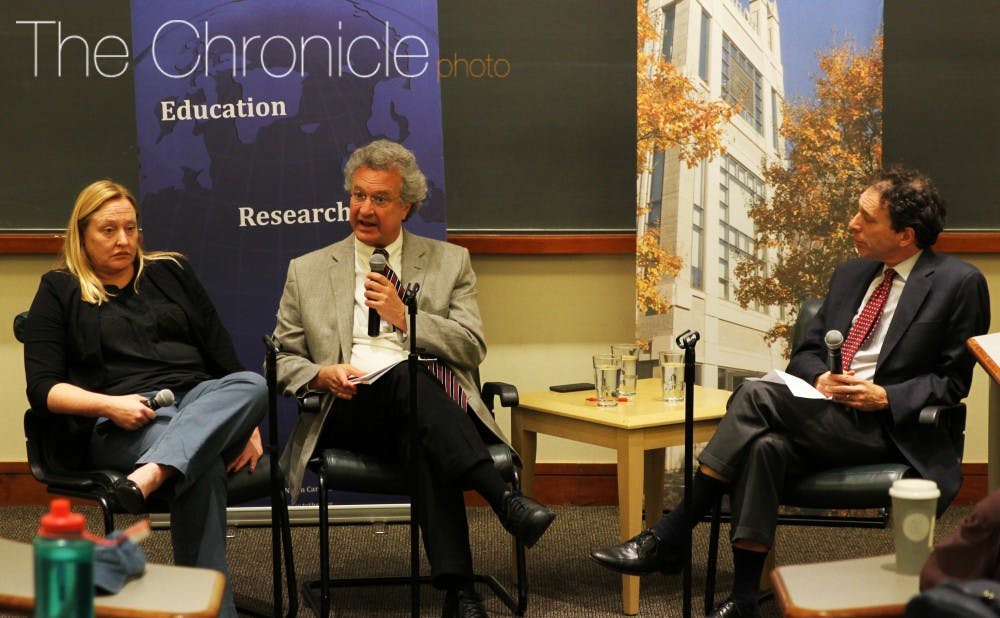Two leaders of the Southern Poverty Law Center spoke about their work investigating the rise of radical right-wing extremism in the United States.
Richard Cohen, the nonprofit legal advocacy group's president, and Heidi Beirich, the intelligence project director, connected the spike in radical right-wing hate groups to the 2016 presidential election.
“[Trump’s] rhetoric energized the radical right,” Cohen said. “Typically white supremacists sit out the campaign because they don't think there's a dime of difference between the two parties—they think of both of them as irredeemably corrupt. This time, they embraced Mr. Trump's candidacy.”
During the talk, which was attended by about 130 people, Cohen noted that there are several forms of extremist ideologies in the U.S., including radical right-wing terrorism and radical Islamic groups. However, he suggested that the Sept. 11 terrorist attacks caused the government to fail to monitor radical right-wing terrorism effectively.
“The pendulum in terms of keeping track of terrorism just swung entirely in the direction of going after radical forms of Islam,” he said. “Really this failure was a bipartisan affair. It was as much President Obama's fault as it was President Bush's fault.”
Cohen said that some in the Muslim community perceive that programs focused on extremism are one-sided toward finding radical Islamic extremism, and that the government was sending informants into mosques. He added that the exclusive focus on radical Islamic terrorism could help to strengthen groups such as al-Qaeda and the Islamic State group.
“If you're trying to integrate a religious minority into the mainstream of American life, to cast suspicions on them in that way, to single them out in that way, has the potential to play into a narrative that they're hearing from foreign recruiters," Cohen said.
In its 2016 count, the SPLC identified 917 hate groups, 101 of which were anti-Muslim—a 197 percent increase from the previous year.
Beirich said this was a “massive expansion of hatred” against Muslims.
“The refugee crisis gave groups that work in the anti-Muslim space something to react to and propelled a lot of very local organizing action,” she said. “Also, we just saw that anti-Muslim organizations in general were frankly energized by the campaign and by terrorist attacks, which add to xenophobia against this population. President Trump's remarks about Muslims weren't helpful, and they sort of justified bigotry.”
Beirich also emphasized the rise of another form of extremism—the so-called "alt-right." Such ideologies have long existed in the United States, but they have gained increased traction in part by rebranding from past terms such as “white supremacy” and “white nationalism," she noted.
Although radical right-wing terrorists may not have a centralized base organization like al-Qaeda or the Islamic State group, adherents are often inculcated on websites, such as Stormfront, a white nationalist forum that Beirich referred to as a “den of lone wolves.”
Cohen attributed the mainstreaming of this form of hate to political rhetoric from key alt-right figures like White House chief strategist Stephen Bannon and white supremacist Richard Spencer.
Spencer’s self-identification as a racist reduced the shame that came from the label, Cohen said, adding that Bannon’s “proud” declaration of Breitbart as the news source of the alt-right further advanced the movement.
“The white supremacists are celebrating,” Cohen said. “They see their man as whispering in the president's ear.”
The event was sponsored by the Sanford School of Public Policy and the Triangle Center on Terrorism and Homeland Security, which is directed by David Schanzer, associate professor of the practice in the Sanford School of Public Policy and moderator of the event.
Get The Chronicle straight to your inbox
Signup for our weekly newsletter. Cancel at any time.

